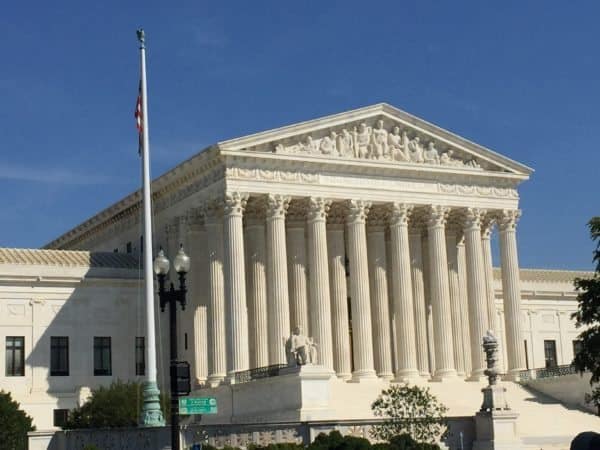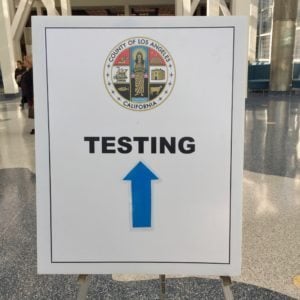
It seems that at least once a week nowadays, I get a call asking whether an initial coin offering (ICO) is regulated at all, and the question came to a head at a recent Legal Hackers LA discussion on smart contracts by Daniel Rice. The long and short of it is that it probably is—though it does depend on what exactly you’re doing.
 Whereas crowdfunding is merely a method of fundraising, an ICO in most cases is merely a new name for an old thing—capital raising. The “coin” in an ICO is a symbol of ownership interest in an enterprise—a digital stock certificate, if you will. The mere use of a different material to represent an economic interest does not mean its an activity outside the scope of securities regulations.
Whereas crowdfunding is merely a method of fundraising, an ICO in most cases is merely a new name for an old thing—capital raising. The “coin” in an ICO is a symbol of ownership interest in an enterprise—a digital stock certificate, if you will. The mere use of a different material to represent an economic interest does not mean its an activity outside the scope of securities regulations.
For those of you not familiar with what ICOs are, here’s a quick summary. Lots of folks working in the blockchain world needed money to fund their project or startup. So they decided to invent their own “coin” variant and sold those coins to fund their project/startup, in exchange for some financial upside in the project.
Sound familiar? That’s because it is. This is the story of every capital-hungry startup/business/entrepreneur.
 I’ve heard ICOs described as a “donation with financial upside” or “crowdsale” (whatever that is), and a number of other things—to try to avoid securities laws. First of all, a donation is a donation— you’re giving away money (or bitcoin), and there is no financial upside to a donation. A “crowdsale” of tokens—to the extent those “tokens” represent securities—is still a security. There are a number of different things that ICOs are doing, so it’s difficult to address the entire industry in one article, but let me impart some guidance to make this easier to understand: If walks like a duck and quacks like a duck, its probably a duck.
I’ve heard ICOs described as a “donation with financial upside” or “crowdsale” (whatever that is), and a number of other things—to try to avoid securities laws. First of all, a donation is a donation— you’re giving away money (or bitcoin), and there is no financial upside to a donation. A “crowdsale” of tokens—to the extent those “tokens” represent securities—is still a security. There are a number of different things that ICOs are doing, so it’s difficult to address the entire industry in one article, but let me impart some guidance to make this easier to understand: If walks like a duck and quacks like a duck, its probably a duck.
The Story of Howey
So why are ICOs probably regulated by securities laws? It all began with the story of a dude named Howey.
Once upon a time, a creative Florida entrepreneur and citrus farmer named Howey endeavored in selling real estate contracts for the development of citrus groves via a lease-back—meaning that he sold the land and would lease it back from the new owner to farm on it. He received the profits of the citrus produce, and the buyers earned rental income from the lease.
Despite Howey’s success, the U.S. SEC was unhappy with this little enterprise. Specifically, it was not pleased with how he marketed his promotional materials promising large profits in tourist areas where the targets of the ads were neither residents of Florida nor experienced in farming or agriculture.

As a result, the SEC took Howey to task and filed a lawsuit to against him. It went to the Supreme Court, which ruled that Howey was offering an “investment contract” as defined by the Securities Act of 1933. As a part of this ruling, the Supreme Court developed a test called—you guessed it—the Howey Test, to determine whether an opportunity constitutes an “investment contract.”
In any investment offering, the question to ask is whether the offering is an “investment contract” under the Howey Test, which is defined as follows:
- an investment of money due to
- an expectation of profits arising from a
- common enterprise which
- depends solely on the efforts of a promoter or third party.
This test says that whenever you’re trying to raise money, if the investor is relying on your efforts to make their profits, you are considered to be selling a security.
Whether or not a certain investment opportunity—in this case, an ICO—is considered a security is important because the issuer, or seller of the security, must either register the offering or comply with the rules around exemptions from registration.
Applying the Test
 An investment of money
An investment of money
If you’re asking for money, you fulfill this prong of the test. If you’re asking for bitcoin or some cryptocurrency variant, at least one magistrate judge has already declared that bitcoin is a “currency or form of money.” But services probably aren’t; supplying a garage for developers to work out of probably isn’t either.
An Expectation of Profits
Sometimes potential clients argue with me that an ICO cannot be a security because the coins don’t give voting rights. Oh honey, if only it were that simple. Voting rights aren’t what makes a security. It’s whether the person that’s giving money (or coins) expects profits (or, in the converse, could result in economic loss) in the future. Similarly, proclaiming that the ICO is a “donation” with financial incentive or upside doesn’t mean it’s not a security.
A Common Enterprise or Scheme
I realize this is frustrating to non-lawyers, but there really isn’t one definition of a “common enterprise.” I usually simply the question to clients by asking whether they’re pooling the funds together for a common plan or in some common way. If we’re getting technical, there are 3 different approaches to defining a “common enterprise” depending on where you are—the horizontal approach (which asks if funds are pooled together so that investors share in risk and benefits via a common venture), the narrow vertical approach (which asks the investor and fundraiser are exposed to risk and whether their fortunes are linked), and the broad vertical approach (which asks whether the investor’s success depends on the fundraiser’s expertise).
Depends on Efforts of Another
Someone is going to have to put in time and energy to make this company potentially generate profits. Is that someone you, or someone else? Typically, the people in the company work hard on some potentially money-making endeavor, and outsiders take a more passive role. I often heard of folks trying to classify investors as “partners”—but if those partners aren’t bringing unique and vital skills and expertise to the table and playing an active role, it’s not a true partnership. Some companies have an open source angle and stress that the success of the project depends on the participation of the ICO investors and third parties. I’m personally not convinced that having a couple of hundred investors mine for coins makes a big difference in this calculus. I’ve invested in companies before where I made introductions to potentially significant contracts for the company, and have bought gift certificates to gift to family and friends to financially support those investments—but that didn’t make me or my efforts part of the company.
Still, it poses an interesting question of whether it’s a security if everyone contributes something? Or no one (at least not a human)? The Decentralized Autonomous Organization (DAO) experiment last year was a self-executing smart contract under which proposals from the community of The DAO investors would be voted on and thus control how funds were deployed. One might argue that all DAO investors retained a degree of management and control, since participant proposals would govern the deployment of funds. An alternative argument might be that no one controlled, since the controls were programmed into the blockchain (though one could argue that anyone who coded the blockchain exercised management and control). In the end, someone (we may never know who) hacked—or at least found a loophole—in the DAO code and made off with $50 million. The community split over what to do and who was the blame. In this scenario, I believe that the “issuer” was the core group of folks who programmed the blockchain—and not those who invested in the DAO or submitted proposals.
What are the potential consequences?
So what happens if you decide to forge ahead with an ICO without regard for securities laws? Well, it depends.
Selling unregistered securities without an exemption is considered a Section 5 violation of the Securities Act of 1933. It could result in either civil or administrative suits, in which the SEC could ask the courts for a section or remedy. If the sale of securities is still happening, they might ask for an injunction to make you stop whatever it is that you’re doing, and could force you to undergo audits, accounting for frauds, or special supervisory arrangements. The SEC can also ask for civil monetary penalties or the return of illegal profits (called disgorgement), and can bar you from serving as a company director or officer or engaging in the sale of securities.
 The latter is particularly significant for entrepreneurs—I find that tech entrepreneurs often don’t care so much about fines or returning money, but the last bit pretty much prevents them from ever founding or working at a high level with any startup in the future, given that most startups need to raise capital to survive. It acts, effectively, as the end of one’s entrepreneurial or startup career. (You could still work as an employee or staff person, but not as a director or officer of the company).
The latter is particularly significant for entrepreneurs—I find that tech entrepreneurs often don’t care so much about fines or returning money, but the last bit pretty much prevents them from ever founding or working at a high level with any startup in the future, given that most startups need to raise capital to survive. It acts, effectively, as the end of one’s entrepreneurial or startup career. (You could still work as an employee or staff person, but not as a director or officer of the company).
In the case of Erik Voorhees of SatoshiDICE and FeedZeBirds, in 2014:
“Voorhees agreed to settle the SEC’s charges by paying full disgorgement of the $15,843.98 in profits plus a $35,000 penalty for a total of more than $50,000 […] The SEC’s order finds that Voorhees violated Sections 5(a) and 5(c) of the Securities Act of 1933. Voorhees consented to cease and desist from committing or causing any future violations of the registration provisions without admitting or denying the SEC’s findings. In addition to the monetary sanctions, Voorhees agreed that he will not participate in any issuance of any security in an unregistered transaction in exchange for any virtual currency including Bitcoin for a period of five years. The entry of the SEC’s order disqualifies Voorhees from relying on Rule 506(b) and 506(c) of Regulation D under the Securities Act, as defined in the bad actor disqualification provisions of Rule 506.”
This basically means that Voorhees paid back profits, a penalty, and pretty much cannot raise capital for five years, since 99% of private capital is raised under Rule 506(b) and 506(c) of Regulation D.
It’s Going To Take Regulators A While To Figure This Out
 As you might take away from the questions around DAO above, blockchain technology presents several novel questions in securities laws, and I suspect it will take a while for regulators and courts to grapple with how to deal.
As you might take away from the questions around DAO above, blockchain technology presents several novel questions in securities laws, and I suspect it will take a while for regulators and courts to grapple with how to deal.
I should note that there has been some regulatory guidance by a bunch of difference regulators that’s a bit all over the place—FinCEN in 2013 provided guidance that classified virtual currency businesses as money services businesses (aka money transmitted businesses or MTBs); the US Commodity Futures Trading Commission (CTFC) seems to be wanting to regulate virtual currency as a currency; and the SEC has warned investors about fraudulent investment schemes involving virtual currency.
This is all very confusing, no? My takeaway from this plethora of non-guiding guidance is simply that regulators are struggling to grapple in understanding this issue, and that all the regulators want jurisdiction in being able to regulate the industry—although each of them may regulate from a different perspective and for a different purpose.
 Amy Wan, Esq.CIPP/US, is a Senior Contributor to Crowdfund Insider. Amy is a Partner at Trowbridge Sidoti LLP (CrowdfundingLawyers.net) where she practices crowdfunding and syndication law. Formerly, she was General Counsel at Patch of Land, a real estate marketplace lending platform. While there, Amy pioneered the industry’s first payment dependent note that is secured pursuant to an indenture trustee and designed to be bankruptcy remote, and advised the company on its Series A funding round. In recognition her work at Patch, she was named as a Finalist for the Corporate Counsel of the Year Award 2015 by LA Business Journal. Amy also brings extensive experience in legal innovation and rethinking the delivery of legal services. She is the founder and co-organizer of Legal Hackers LA, and was named one of ten women to watch in legal technology by the American Bar Association Journal in 2014.
Amy Wan, Esq.CIPP/US, is a Senior Contributor to Crowdfund Insider. Amy is a Partner at Trowbridge Sidoti LLP (CrowdfundingLawyers.net) where she practices crowdfunding and syndication law. Formerly, she was General Counsel at Patch of Land, a real estate marketplace lending platform. While there, Amy pioneered the industry’s first payment dependent note that is secured pursuant to an indenture trustee and designed to be bankruptcy remote, and advised the company on its Series A funding round. In recognition her work at Patch, she was named as a Finalist for the Corporate Counsel of the Year Award 2015 by LA Business Journal. Amy also brings extensive experience in legal innovation and rethinking the delivery of legal services. She is the founder and co-organizer of Legal Hackers LA, and was named one of ten women to watch in legal technology by the American Bar Association Journal in 2014.

